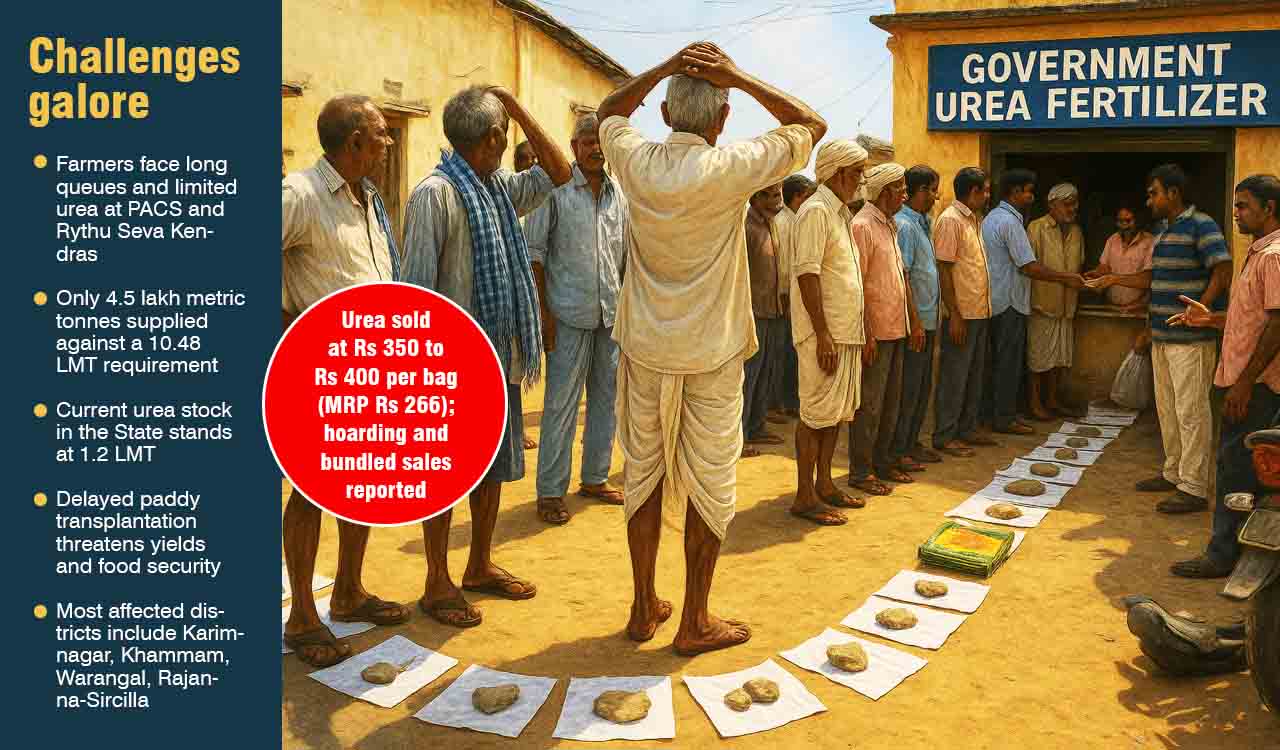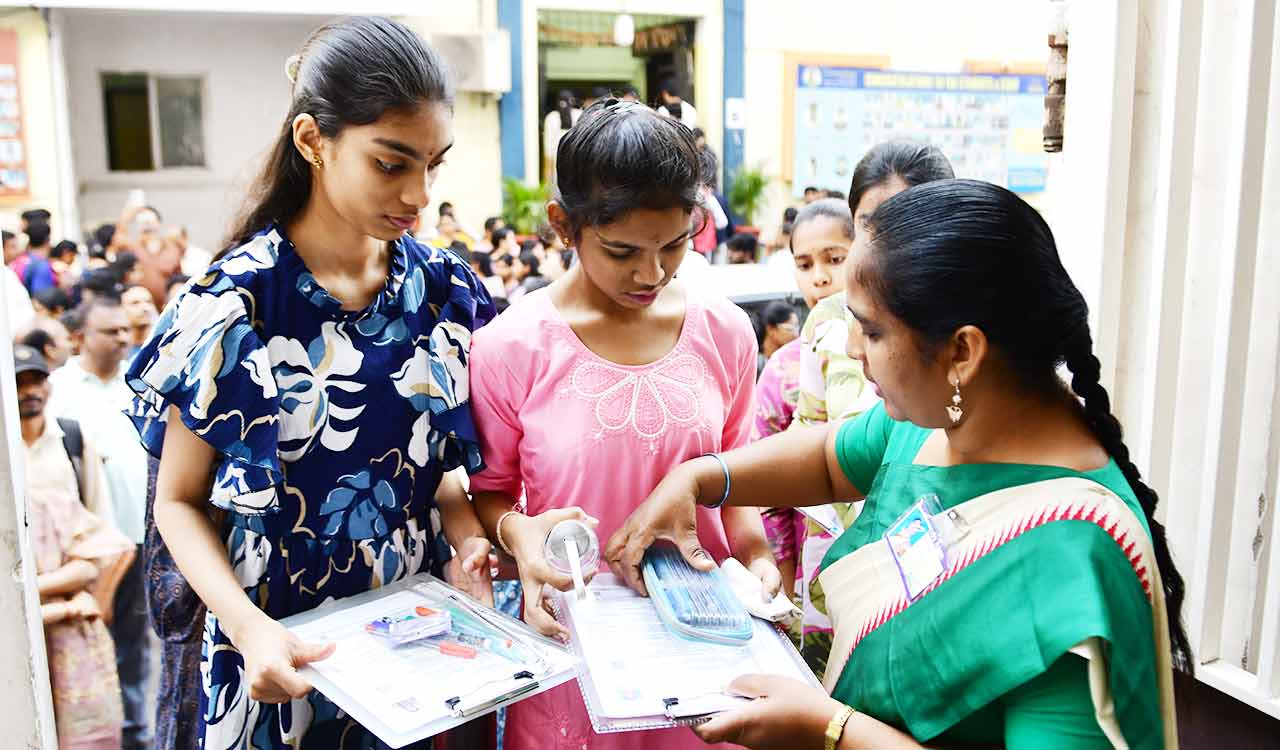Urea crisis: Farmers caught in Centre-State blame game as Kharif season hangs in balance
Telangana’s farmers face an acute urea shortage amid disputes between State and central governments. Delayed paddy transplantation, long queues, and black-market activity threaten 10–15% crop losses, fuelling unrest and raising concerns over food security and farmer livelihoods

Hyderabad: A crippling urea shortage has left Telangana’s farmers in an unforeseen crisis. Trapped in a bitter blame game between the State and central governments, with both sides dodging accountability, the Kharif farmers find themselves on the brink of a disaster.
Deprived of the adequate supplies of urea that give essential nutrients to crops, enhancing soil fertility and boosting yields, they are losing hope on the crop season. Farmers are forced to queue up before dawn, fight at distribution centres and resort to black-market purchases. The acute scarcity of this vital fertilizer threatens a 10–15% drop in crop yields. It may result in widespread distress and food insecurity. The State’s accusations of central negligence and the Centre’s claims of adequate supply have only deepened the crisis.
Across Telangana, from Karimnagar’s Vennampalli to Mahabubabad’s Thorrur, farmers are seen making beelines before Primary Agricultural Cooperative Societies (PACS) and Rythu Seva Kendras, often returning empty-handed or with just one or two 45-kg urea bags per Aadhaar card, far below their needs.
In Thimmapur mandal, a clash erupted at a PACS in Mallapur village over limited stock, while in Rajanna-Sircilla’s Rudrangi mandal, police personnel were deployed to manage chaotic crowds after farmers left slippers to hold their places in line. In Thorrur, farmers blocked the Khammam-Warangal highway, alleging that 200 urea bags were diverted to the black market, where prices have skyrocketed to Rs 350–Rs 400 against the subsidised rate of Rs 266.50.
The crisis is particularly dire as paddy transplantation, already delayed by erratic rainfall, faces a critical deadline. Agricultural experts warn that paddy transplantation and prompt urea application beyond the third week of August will be ineffective, risking irreversible damage to paddy.
“I’ve been waiting for hours for one bag for three acres of paddy,” said Venkatesh, a farmer from Nalgonda. “If we don’t get urea soon, our crops are finished.” With only 35 lakh acres of the targeted 66 lakh acres sown so far, the stakes are high, and farmers are running out of time.
State points the finger at Centre
Agriculture Minister Thummala Nageswara Rao has accused the Central government of “playing with farmers’ lives” by failing to deliver promised urea allocations. He claimed that despite an allocation of 9.80 lakh metric tonnes (LMT) for the 2025 Kharif season, the State received only 4.50 LMT from April to July, resulting in a shortfall of 5.30 LMT. The deficit was 32% from April to June, rising to 45% in May, with August facing a 35% shortage as only 1.70 LMT has been allocated against a requirement of 3.50 LMT.
Nageswara Rao highlighted logistical failures, noting that no ships have been assigned for the 0.97 LMT of imported urea promised for July, despite repeated appeals to Union Minister J.P. Nadda.
“The Centre’s negligence is a direct attack on Telangana’s farmers,” he alleged, demanding immediate action to bridge the gap.
Chief Minister A Revanth Reddy and State MPs have raised the issue in Parliament, pressing for increased domestic supply from Ramagundam Fertilizers and Chemicals Limited (RFCL) and expedited imports. Farmers’ organizations, including the All India Kisan Sabha, have also criticised the Centre’s push for nano urea, which farmers reject due to its, what they called, labour-intensive application and its poor impact during rains.
“Nano urea washes away; regular urea is what we need,” said KVNL Narasimha Rao from Nelakondapalli.
Centre’s denial fuels outrage
In a stark contrast, Union Minister of State for Chemicals and Fertilizers Anupriya Patel claimed that urea availability in Telangana has been “adequate” for Kharif 2025 season, citing data on fertilizer distribution over the past decade. Patel emphasized that fertilizers are essential commodities under the Fertilizer Control Order, 1985, and State governments are empowered to curb black marketing, hoarding, and diversion under the Essential Commodities Act, 1955. She urged Telangana to take punitive action against malpractices, effectively shifting the blame back to the State.
Farmers and opposition leaders have dismissed Patel’s claims as detached from reality.
“If the supply is adequate, why are we standing in queues for days?” asked a farmer from Kurikyala in Gangadhara mandal, where former MLA Sunke Ravishankar intervened to address grievances. The Bharat Rashtra Samithi (BRS) has accused the Congress-led State government of mismanagement, while the State counters that the Centre’s failure to deliver is the root cause.
“The Centre says there’s enough urea, but we’re holding just 1.20 LMT in stock. Where’s the rest?” asked a State agriculture official.
Black Marketing
Urea shortage has fuelled a thriving black market, with private dealers allegedly hoarding stocks or bundling urea with less popular fertilizers, a condition imposed by suppliers. In Adilabad, Kamareddy and Suryapet, protests have erupted over inflated prices and supply gaps. Tenant farmers and tribals, lacking Aadhaar cards or passbooks, are hit hardest, unable to access subsidized urea.
“Landowners get OTPs, but we till the land and get nothing,” said a farmer.
Related News
-
South Central Railway launches Rail Parcel Logistics app
8 hours ago -
CMR Engineering College hosts CSI AI 100K Program
9 hours ago -
Vote for Mouse Deer conservation, urges Hyderabad zoo
9 hours ago -
Paras Dogra controversy overshadows J&K’s strong showing against Karnataka
9 hours ago -
India face tough Zimbabwe test after South Africa loss in T20 World Cup
9 hours ago -
India beat Australia in shoot-out to end losing streak in FIH Pro League
9 hours ago -
Dev Ruparelia advances with straight-game win at Dutch Junior International
9 hours ago -
Housemaid held for Rs 3.88 lakh gold theft in Hyderabad
9 hours ago




